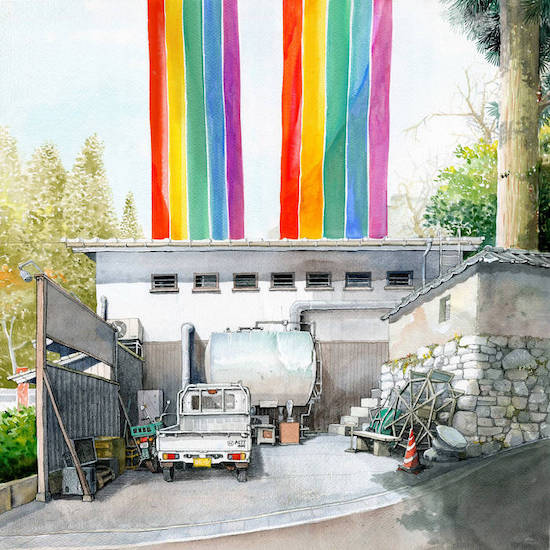Double Rainbow, a split LP between Japanese singer and guitarist Kumio Kurachi and Glasgow-based “acoustic bass troubadour”, Howie Reeve, announces itself with a volley of atonal rasps from the saxophone. It’s a playful start that normally would be balanced with something more reflective. What we get instead is an ever-changing segue of acoustic reflections with short sharp shocks of noise, administered like some wild psychic booster jab, courtesy of NoMeansNo guitarist Andy Kerr and French saxophonist, Cathy Heyden.
The effect overall is dizzying. When the listener gladly finds some semblance of a pattern to cling to, that comfort is wrested from them with a new aural thoughtform. Imagine an Eric Chenaux record, but one chopped up and spliced together at a quicker tempo.
I think it is fair to say that Howie Reeve’s music is music of the senses. The lyrics are often arresting, small vignettes or observations suggesting a keen awareness of his immediate surroundings and a predilection to document his fleeting, floating world in miniature. This is a work – and an inner world – that deliberately tests the emotions of both the maker and their audience by foregrounding raw emotional, hyper personal content. Further, Reeve’s way of paying libation to his muse is rarely stationary or sedentary, even in the more reflective and meandering passages.
Remarkably, the album is not actually that heavy a listen though, as Reeve often employs a gleeful, simple pop style that sounds like it draws on the likes of Orange Juice circa Ostrich Churchyard or Kevin Ayres. Now and again things sound like Daevid Allen noodling away on his own. Yet giving too many name checks as to style may be misleading, as Howie Reeve’s approach is essentially one divorced from the traditions of “making a pop record”. This is a record that draws on the great squat-driven energies that shaped the likes of Amon Düül, Michael English, and Nigel Weymouth, and a gazillion lost punk bands.
Reeve’s music finds a soulmate on the flipside with Fukuoka native and multi-instrumentalist Kumio Kurachi. The soulmate tag may not be entirely misplaced as the record’s title, Double Rainbow, commemorates the pair’s first meeting. Kurachi’s music is slightly more approachable, a mellifluous stream of consciousness using enough harmonic and melodic structures and folk rock props that give the listener a sense of trust in letting the music do its thing. Now and again we get a funny kind of cabaret that sounds as if it’s a dadaist drinking song. My Japanese is non existent, but I have the feeling that his lyrics stand central to his work. It would be great to have a translated lyric sheet as Kurachi’s voice is very expressive; one that easily conveys the emotional content of these tracks. Of course, Japan has a strong tradition of wandering hippy minstrels and lunatic mystics who work on the fringes of rock and roll. Yet this nineteen-minute aural thoughtform is very much in the same tradition as Reeve’s. You can see how they make an effective double act.
Double Rainbow is not an easy listen at times, at all. But it is one that, if you give it enough attention, does begin to take a hold on your soul. It is a document of a kind of music that has long stood on its soapbox in squats and unseen spaces around the world. And the two musical protagonists, Howie Reeve and Kumio Kurachi, are part of a wider tradition of underground troubadours and gleemen, musical ranters and shakers, who hold audiences through their strength of character. Their number is – or was until recently – legion. Given the uncertainty in what happens after Covid-19, and the increasing loss of free public spaces in general, is a record like this one of many swansongs? I would hope not.


